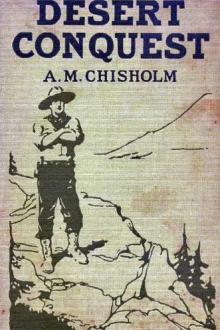Cabin Fever by B. M. Bower (bill gates book recommendations .txt) 📕

Read free book «Cabin Fever by B. M. Bower (bill gates book recommendations .txt) 📕» - read online or download for free at americanlibrarybooks.com
- Author: B. M. Bower
Read book online «Cabin Fever by B. M. Bower (bill gates book recommendations .txt) 📕». Author - B. M. Bower
“No, no, no! Tell a worl' no, no, no!” he remonstrated vehemently, until Bud whooped with laughter.
“All right—all right! Keep your gold, durn it. You're like all the rest—minute you get your paws on to some of the real stuff, you go hog-wild over it.”
Cash was pouring the fine gold back into the buck skin bag and the baking-powder cans.
“Let the kid play with it,” he said. “Getting used to gold when he's little will maybe save him from a lot of foolishness over it when he gets big. I dunno, but it looks reasonable to me. Let him have a few nuggets if he wants. Familiarity breeds contempt, they say; maybe he won't get to thinkin' too much of it if he's got it around under his nose all the time. Same as everything else. It's the finding that hits a feller hardest, Bud—the hunting for it and dreaming about it and not finding it. What say we go up to the claim for an hour or so? Take the kid along. It won't hurt him if he's bundled up good. It ain't cold to-day, anyhow.”
That night they discussed soberly the prospects of the claim and their responsibilities in the matter of Lovin Child's windfall. They would quietly investigate the history of old Nelson, who had died a pauper in the eyes of the community, with all his gleanings of gold hidden away. They agreed that Lovin Child should not start off with one grain of gold that rightfully belonged to some one else—but they agreed the more cheerfully because neither man believed they would find any close relatives; a wife or children they decided upon as rightful heirs. Brothers, sisters, cousins, and aunts did not count. They were presumably able to look after themselves just as old Nelson had done. Their ethics were simple enough, surely.
Barring, then, the discovery of rightful heirs, their plan was to take the gold to Sacramento in the spring, and deposit it there in a savings bank for one Lovins Markham Moore. They would let the interest “ride” with the principal, and they would—though neither openly confessed it to the other—from time to time add a little from their own earnings. Bud especially looked forward to that as a compromise with his duty to his own child. He intended to save every cent he could, and to start a savings account in the same bank, for his own baby, Robert Edward Moore—named for Bud. He could not start off with as large a sum as Lovins would have, and for that Bud was honestly sorry. But Robert Edward Moore would have Bud's share in the claims, which would do a little toward evening things up.
Having settled these things to the satisfaction of their desires and their consciences, they went to bed well pleased with the day.
CHAPTER TWENTY-ONE. MARIE'S SIDE OF IT
We all realize keenly, one time or another, the abject poverty of language. To attempt putting some emotions into words is like trying to play Ave Maria on a toy piano. There are heights and depths utterly beyond the limitation of instrument and speech alike.
Marie's agonized experience in Alpine—and afterward—was of that kind. She went there under the lure of her loneliness, her heart-hunger for Bud. Drunk or sober, loving her still or turning away in anger, she had to see him; had to hear him speak; had to tell him a little of what she felt of penitence and longing, for that is what she believed she had to do. Once she had started, she could not turn back. Come what might, she would hunt until she found him. She had to, or go crazy, she told herself over and over. She could not imagine any circumstance that would turn her back from that quest.
Yet she did turn back—and with scarce a thought of Bud. She could not imagine the thing happening that did happen, which is the way life has of keeping us all on the anxious seat most of the time. She could not—at least she did not—dream that Lovin Child, at once her comfort and her strongest argument for a new chance at happiness, would in ten minutes or so wipe out all thought of Bud and leave only a dumb, dreadful agony that hounded her day and night.
She had reached Alpine early in the forenoon, and had gone to the one little hotel, to rest and gather up her courage for the search which she felt was only beginning. She had been too careful of her money to spend any for a sleeper, foregoing even a berth in the tourist car. She could make Lovin Child comfortable with a full seat in the day coach for his little bed, and for herself it did not matter. She could not sleep anyway. So she sat up all night and thought, and worried over the future which was foolish, since the future held nothing at all that she pictured in it.
She was tired when she reached the hotel, carrying Lovin Child and her suit case too—porters being unheard of in small villages, and the one hotel being too sure of its patronage to bother about getting guests from depot to hall bedroom. A deaf old fellow with white whiskers and poor eyesight fumbled two or three keys on a nail, chose one and led the way down a little dark hall to a little, stuffy room with another door opening directly on the sidewalk. Marie had not registered on her arrival, because there was no ink in the inkwell, and the pen had only half a point; but she was rather relieved to find that she was not obliged to write her name down—for Bud, perhaps, to see before she had a chance to see him.
Lovin Child was in his most romping, rambunctious mood, and Marie's head ached so badly that she was not quite so watchful of his movements as usual. She gave him a cracker and left him alone to investigate the tiny room while she laid down for just a minute on the bed, grateful because the sun shone in warmly through the window and she did not feel the absence of a fire. She had no intention whatever of going to sleep—she did not believe that she could sleep if she had wanted to. Fall asleep she did, however, and she must have slept for at least half an hour, perhaps longer.
When she sat up with that startled sensation that follows unexpected, undesired slumber, the door was open, and Lovin Child was gone. She had not believed that he could open the door, but she discovered that its latch had a very precarious hold upon the worn facing, and that a slight twist of the knob was all it needed to swing the door open. She rushed out, of course, to look for him, though, unaware of how long she had slept, she was not greatly disturbed. Marie had run after Lovin Child too often to be alarmed at a little thing like that.
I don't know when fear first took hold of her, or when fear was swept away by the keen agony of loss. She went the whole length of the one little street, and looked in all the open doorways, and traversed the one short alley that led behind the hotel. Facing the street was the railroad, with the station farther up at the edge of the timber. Across the railroad was the little, rushing river,





Comments (0)